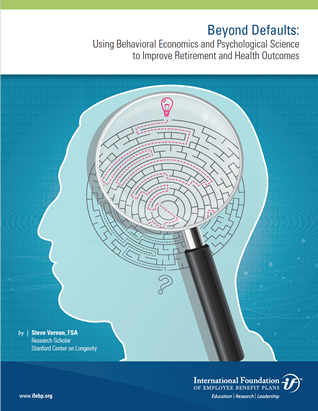Beyond Defaults: Using Behavioral Economics and Psychological Science to Improve Retirement and Health Outcomes
By Steve Vernon, FSA
Research Scholar, Stanford Center on Longevity
 Evidence is accumulating that financial literacy and health education programs are not successful to move most participants to action to address the significant challenges they face about their health and financial security. Such programs may be successful at raising awareness about these challenges, but they are not sufficient to improve retirement and health outcomes among a broad population.
Evidence is accumulating that financial literacy and health education programs are not successful to move most participants to action to address the significant challenges they face about their health and financial security. Such programs may be successful at raising awareness about these challenges, but they are not sufficient to improve retirement and health outcomes among a broad population.
As a result, employers, retirement plan sponsors, and financial institutions are interested in learning how to move beyond merely providing information and educational programs to improve participants’ financial security and health.
In response to this interest, the International Foundation of Employee Benefit Plans (IF) hosted a summit in March 2018 to explore how to deploy behavioral economics and psychological science in retirement and benefit plans. The Summit featured behavioral economics researchers Kristen Berman of the Common Cents Lab and Justin Sydnor, PhD, from the University of Wisconsin, and was facilitated by Steve Vernon, FSA, Research Scholar at the Stanford Center on Longevity.
The goals for the Summit were to identify decisions that need improvement, how plan sponsors could measure improvement, and then explore possible behavioral interventions that go beyond pure education. Over 200 IF members participated and provided their input.
The full white paper summarizes the main observations and conclusions from this summit. The IF also published two shorter articles in its monthly Benefits Magazine. All three articles can be viewed or downloaded here.

